
Botanical Sciences
Scope & Guideline
Championing open access for the advancement of plant sciences.
Introduction
Aims and Scopes
- Plant Taxonomy and Systematics:
Research on the classification, identification, and phylogeny of plant species, particularly endemic and economically important species in Mexico. - Ecological Studies:
Investigations into plant ecology, including community dynamics, ecosystem services, and the impacts of climate change on plant distributions. - Ethnobotany and Traditional Knowledge:
Exploration of the relationships between local communities and plant species, including medicinal uses and traditional management practices. - Conservation Biology:
Studies aimed at understanding threats to plant diversity and strategies for conservation, including restoration ecology and biodiversity assessments. - Physiological and Morphological Research:
Investigations into plant physiology, morphology, and development, particularly under varying environmental conditions. - Agroecology and Sustainable Practices:
Research promoting sustainable agricultural practices, including the role of native plants in agricultural systems.
Trending and Emerging
- Climate Change Impact Studies:
There is an increasing focus on understanding how climate change affects plant distributions, phenology, and ecosystem dynamics. - Functional Ecology:
Research examining the functional traits of plants and their ecological roles is gaining traction, emphasizing the importance of plant functions in ecosystems. - Urban Botany and Green Infrastructure:
Emerging studies on the role of plants in urban environments and the integration of green infrastructure highlight the interaction between urbanization and plant diversity. - Genetic Diversity and Conservation Genetics:
A growing number of papers are emphasizing genetic studies, including population genetics and conservation genetics, to inform conservation strategies. - Microbiome and Plant Interactions:
Emerging research on the interactions between plants and their associated microbiomes is becoming prominent, highlighting the importance of these relationships for plant health and productivity.
Declining or Waning
- Invasive Species Management:
Research on the management of invasive plant species has seen a decline, possibly due to a shift in focus towards conservation of native species and ecosystems. - Historical Biogeography Studies:
There seems to be a waning interest in historical biogeography, as more emphasis is placed on current ecological dynamics and conservation. - Traditional Agricultural Practices:
Although still present, the exploration of traditional agricultural practices has decreased, with more studies focusing on modern sustainable practices and agroecology. - Paleobotanical Research:
The frequency of paleobotanical studies has diminished, possibly overshadowed by contemporary ecological and conservation issues.
Similar Journals

Botanical Studies
Connecting Scholars in the World of BotanyBotanical Studies is a premier open-access journal published by Springer, dedicated to the field of botany and plant sciences. Since its establishment in 2006, the journal has championed innovative research and scholarship that explores diverse botanical topics ranging from plant systematics to ecology and conservation. With a commitment to broad accessibility, it promotes the dissemination of knowledge to researchers, professionals, and students worldwide. Botanical Studies fosters academic collaboration and dialogue, contributing significantly to the global botanical community. Its open-access policy allows unrestricted access to its high-quality, peer-reviewed content, ensuring that vital research is available to all. Join the growing community of scholars advancing botanical science through this essential publication, conveniently located at One New York Plaza, Suite 4600, New York, NY 10004, United States.
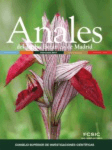
ANALES DEL JARDIN BOTANICO DE MADRID
Your Gateway to Cutting-Edge Botanical ResearchANALES DEL JARDIN BOTANICO DE MADRID is a prominent open-access journal dedicated to the field of Botany, specifically focusing on both Plant Sciences and the broader domains of Ecology, Evolution, Behavior, and Systematics. Published by the esteemed CONSEJO SUPERIOR INVESTIGACIONES CIENTIFICAS-CSIC, this journal has been a vital source of knowledge and academic discourse since its inception. The journal has an ongoing commitment to disseminating research findings, with open access established since 1997, thereby ensuring that valuable scientific insights are readily available to researchers, professionals, and students worldwide. With an impact factor that reflects its relevance in the field and ranked in the Q3 category for Ecology, Evolution, Behavior and Systematics and Plant Science for the year 2023, ANALES DEL JARDIN BOTANICO DE MADRID serves as an essential platform for the publication of innovative studies and the exchange of ideas in the botanical community. The journal covers a variety of topics, from plant morphology and taxonomy to conservation biology, contributing significantly to the advancement of botanical sciences. Researchers looking to enrich their work and engage with a global audience will find this journal an invaluable resource.

Acta Botanica Mexicana
Bridging science and sustainability through plant research.Acta Botanica Mexicana is a premier journal published by Instituto de Ecología AC, dedicated to advancing research in the fields of ecology, plant science, and biological sciences. With an E-ISSN of 2448-7589, this open-access journal facilitates extensive dissemination of scientific findings, ensuring that knowledge is accessible to researchers, professionals, and students worldwide. Established in 2008, Acta Botanica Mexicana has earned a notable reputation, achieving a Q3 ranking in plant science and a Q4 ranking in ecology and evolution for 2023. This positioning underscores its commitment to publishing high-quality research that addresses vital issues in ecological and botanical studies. With a focus on innovative methodologies and pragmatic solutions, the journal invites contributors to share their insights and findings, thus enriching the academic landscape and fostering collaborations that drive the field forward. The journal is based in Michoacán, Mexico, and serves as a key hub for researchers engaging with the challenges and intricacies of plant and ecological studies.

BRITTONIA
Elevating Plant Science Research Since 1931BRITTONIA, published by Springer, stands as a reputable journal dedicated to advancing the fields of botany and plant sciences. With a storied history dating back to 1931, this journal has evolved to embrace contemporary research spanning various aspects of plant biology, ecology, and systematics. Focusing on a comprehensive analysis of both ecological interactions and plant systematics, BRITTONIA plays a crucial role in disseminating knowledge among researchers and professionals committed to understanding plant life and its environmental contexts. Despite its open access status being currently unavailable, the journal ensures wide accessibility through institutional subscriptions. In the latest rankings, it proudly holds a Q2 category in Plant Science and a Q3 category in Ecology, Evolution, Behavior, and Systematics, indicating its growing influence and academic rigor. Researchers and students alike will find BRITTONIA an essential resource for the latest findings and discussions in plant sciences.
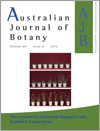
AUSTRALIAN JOURNAL OF BOTANY
Elevating plant research to influence environmental policy.The Australian Journal of Botany is a prestigious peer-reviewed journal published by CSIRO PUBLISHING, dedicated to advancing the field of plant sciences and ecology. Established in 1953, this journal provides a critical platform for researchers to share original research findings, reviews, and perspectives in subjects ranging from plant biology to ecological interactions, with a focus on Australian flora and its conservation. With an impressive impact factor and categorized in the Q3 quartile in both Ecology, Evolution, Behavior and Systematics and Plant Science, the journal ranks competitively within its fields, allowing authors to reach a diverse audience of professionals, students, and fellow researchers. The journal is accessible in print and electronically through its ISSN: 0067-1924 and E-ISSN: 1444-9862, providing wider access to vital research outcomes that influence environmental policies and natural resource management. As it aspires towards innovation and excellence, the Australian Journal of Botany remains an essential resource for those passionate about the richness of plant biodiversity and ecological understanding.
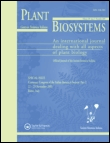
PLANT BIOSYSTEMS
Unveiling the Complexities of Plant Ecology and EvolutionPLANT BIOSYSTEMS, published by TAYLOR & FRANCIS LTD, is a leading academic journal dedicated to advancing the understanding of plant systems and their ecological interactions. With an ISSN of 1126-3504 and an E-ISSN of 1724-5575, this journal holds a significant place in the fields of Ecology and Plant Science, earning a Q2 rank in both categories as of 2023. Established in 1993 and continuing robustly through to 2024, it aims to provide a platform for pioneering research that encompasses a wide array of topics, from evolutionary biology to plant-environment interactions. Although not an open-access journal, it maintains a strong reputation, backed by its impressive Scopus rankings—positioned at #179 in Ecology, Evolution, Behavior and Systematics and #138 in Plant Science, placing it within the top percentiles. PLANT BIOSYSTEMS is a vital resource for researchers, professionals, and students who are keen to contribute to and learn from cutting-edge findings in the ever-evolving domain of plant sciences.

NEW ZEALAND JOURNAL OF BOTANY
Unraveling Nature's Mysteries, One Study at a TimeThe New Zealand Journal of Botany, published by the esteemed Taylor & Francis Ltd, serves as a pivotal platform for disseminating significant research in the fields of Ecology, Evolution, Behavior and Systematics, as well as Plant Science. With a rich history dating back to 1963 and an impressive convergence extending to 2024, this journal has established itself as an essential resource for researchers and professionals dedicated to understanding the complexities of plant life and ecological systems in New Zealand and beyond. The journal is currently categorized in the Q3 quartile for both relevant disciplines as of 2023, reflecting its balanced influence within the global academic community. Although not an open access journal, it retains a significant impact factor, evidenced by its Scopus rankings, which place it within the top half of its categories. This makes it an invaluable tool for students, researchers, and academics aiming to engage with robust, peer-reviewed scientific findings and contribute to the evolving discourse surrounding botany and ecological research.

PHYTON-ANNALES REI BOTANICAE
Connecting researchers with groundbreaking botanical findings.PHYTON-ANNALES REI BOTANICAE is a distinguished journal dedicated to the fields of plant science and ecology, published by Ferdinand Berger Soehne. With its origins tracing back to 1994, this journal has carved a niche in disseminating vital research findings and innovative studies pertaining to botany and environmental biology, despite its coverage being discontinued in Scopus since 2016. The journal's impact extends across various disciplines, reflected in its rankings within the categories of Agricultural and Biological Sciences and Environmental Science, underscoring its commitment to advancing knowledge in plant sciences. While it is not an open-access journal, its rigorous peer-review process ensures high-quality research that is valuable for researchers, professionals, and students alike. Located in Horn, Austria, PHYTON serves as a pivotal platform for sharing significant contributions to the field, fostering a deeper understanding of plant biology and ecology.
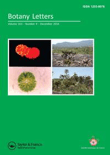
Botany Letters
Innovating for Tomorrow’s Agricultural ChallengesBotany Letters, published by Taylor & Francis Ltd, is a prominent journal in the field of Plant Science based in the United Kingdom. With its ISSN 2381-8107 and E-ISSN 2381-8115, the journal has established itself as an essential resource for researchers, professionals, and students alike, focusing on innovative studies and findings in botany. As a Q2 ranked journal in its category (2023) and holding a respectable Scopus rank of #200 out of 516 in Agricultural and Biological Sciences, it reflects a robust commitment to quality and relevance in the field. The journal's open access model ensures that groundbreaking research is readily accessible, fostering collaboration and knowledge sharing among the global scientific community. Covering a broad spectrum of topics within plant science from 2016, Botany Letters aims to catalyze advancements in the understanding and management of plant biodiversity and sustainability, ultimately contributing to conservation efforts and agricultural innovation.
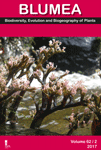
BLUMEA
Shaping the future of ecological studies through rigorous research.BLUMEA is a distinguished peer-reviewed journal published by RIJKSHERBARIUM in the Netherlands, specializing in Ecology, Evolution, Behavior and Systematics as well as Plant Science. With an ISSN of 0006-5196 and an E-ISSN of 0373-4293, this journal has established itself as a vital resource for academics and practitioners alike since its inception in 1993, with plans to continue through 2024. Currently holding a Q2 quartile ranking in both relevant categories, BLUMEA is positioned as a significant contributor to the advancement of knowledge in its fields, generating innovative research that informs sustainable practices and biodiversity conservation. Although it currently does not offer Open Access options, its insights are critical for those involved in plant sciences and ecological research. Positioned within the Scopus database, the journal ranks at the 41st percentile in Plant Science and the 39th percentile in Ecology, reflecting its substantial impact within the academic community. Researchers, students, and professionals who engage with BLUMEA will find it to be an indispensable source for high-quality research and valuable discussions aimed at shaping the future of ecological studies and botanical science.